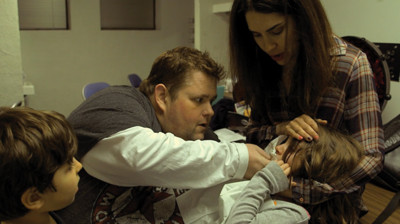
What's Eating Ralphie May?
The thing about phone interviews is that the timing doesn’t always work in an interviewer’s favor. Sometimes the interview gets rescheduled at the last minute, and the subject of the intense documentary calls right as you’re watching the emotional peak of said film. Sometimes you have to spend an entire interview fighting back tears because you’ve always been a sucker for a tragic artist and empathetic vérité. You’ve just watched this person go through some serious shit.
Sometimes you have to stiff-upper-lip your way through a professional conversation when what you really need is a good hard cry. That is exactly what happened when podcaster and comedian Lahna Turner, widow of late comedian Ralphie May, called me to talk about What’s Eating Ralphie May?, the new documentary premiering at this year’s Nashville Film Festival.
“Ralphie was fully on board,” Turner tells the Scene about hiring Cat Rhineheart to film what would be May’s final tour. “Ralphie had always wanted to do reality TV stuff. … And I hated the experience of being on camera.”
The film is a surprisingly candid glimpse of hard-working, hard-traveling artists dealing with fraying relationships and overwhelming addictions. Neither flattering nor vilifying, What’s Eating Ralphie May? works best when its Frederick Wiseman-like access and restraint let the story unfold just out of frame — a family drama played out behind tour-bus doors and in cellphone confessionals.
“Because Ralphie and I were so unique, every six months that we were together some reality show or another would approach us,” says Turner. “And I always said no. But he always wanted to do them. So at this point in our lives, I was like — his management was pushing him to do a reality show. And I said, ‘We’ve got the finances — I’m going to buy a camera, we’re going to do it ourselves.’ ”
The weight-loss reality show planned around May’s lap-band surgery didn’t pan out — May, estranged from Turner, would die in October 2017 at age 45. What’s Eating Ralphie May? is built from those final tour shoots, plus archival footage and the years’ worth of video, the kind of footage that piles up when you are in the business of creating content full time. The intimacy that results is surprisingly free from artifice. There’s also a sense of tension that is relatable if you’ve ever, y’know, cared deeply for another human being.
“It wasn’t supposed to be that story.” Turner says, her voice fluttering with what sounds like exasperation. “I didn’t want to be in it. When I turned the cameras on, it was supposed to be all about Ralphie. This wasn’t the outcome I wanted.”
Of course, some phone interviews are a little less harried than mine with Turner was. Sure, during my chat with Rhinehart — who directed What’s Eating Ralphie May? and produced May and Turner’s podcast Perfect 10 — there is a toddler in my car (my toddler) finding more new and dangerous ways to keep himself occupied. But by this point your intrepid correspondent had watched all of the documentary and found a bit of closure. May’s story is a heart-wrenching example of how mental health and addiction can get out of hand when at the mercy of the entertainment industrial complex.
“It got weird,” says Rhinehart. “I didn’t feel comfortable. Like, ‘I don’t know if I should be filming this.’ The story I captured was not the story I was trying to capture. Sometimes it felt invasive, like a violation. This wasn’t The Real Housewives, I wasn’t trying to get this drama.
“Ethically, it was hard to find this balance,” she continues. “ ‘Should I keep rolling?’ I didn’t know sometimes.”
Teetering along that line is what makes What’s Eating Ralphie May? more than just a comedy doc. The way Rhinehart negotiates her ethical quandaries while presenting the complexities of her subjects is deft and delicate, oscillating between dear-friend and deer-in-headlights without losing a sense of objectivity.
The film features no talking heads, no trashy narration — just a filmmaker trapped in the room with some cute kids and a fighting couple. Turner and May’s kids, it should be mentioned, are smart and kind and adorable, which gives the whole film a Battleship Potemkin/Odessa Steps vibe, except the carriage is their parents’ relationship. It is a testament to both the quality of the filmmaking and the ultimate sadness of the story.
“Every one of us is either a little bit Ralphie or a little bit Lahna, at different times in our life,” Rhinehart tells the Scene. “People that have had addiction in their lives respond to it very differently than people who haven’t, but I hope that‘s relatable.”





